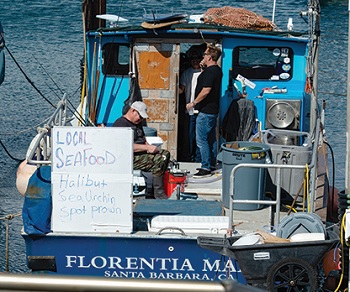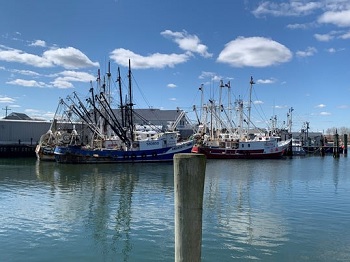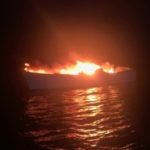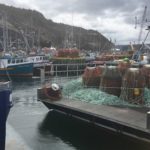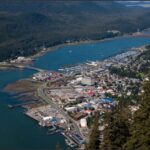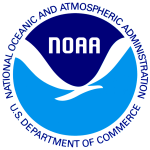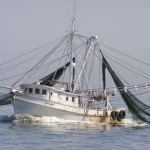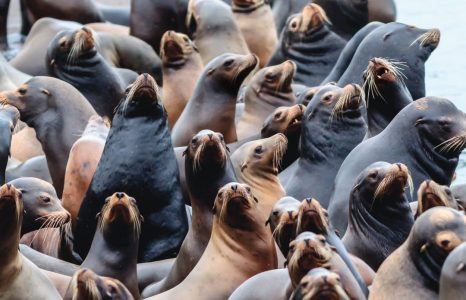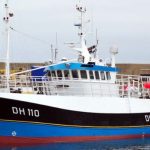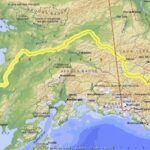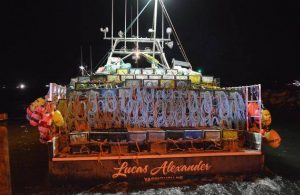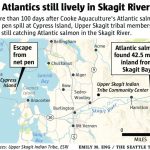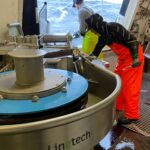Category Archives: Pacific
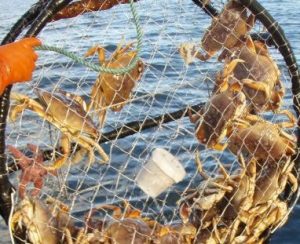
California crab fishery to close May 15th for whale protection
Commercial fishermen are protesting an order by California wildlife authorities to close the Dungeness crab fishery in mid-May to protect whales and sea turtles from becoming entangled in fishing gear. There have been no confirmed interactions between commercial Dungeness crab gear and any whales during the current crab season, which began in December, Ben Platt, president of the Crescent City-based California Coast Crab Association, said in a statement. The crab association statement characterized harm to migratory whales from commercial crab fishing gear as a “perceived risk.” The group said that cooperative measures between the fishing fleet and the state make it extremely rare for there to be interactions between Dungeness crab gear and subgroups of humpback whales that are categorized as endangered or threatened. >click to read< 18:24
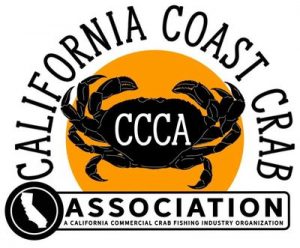 Dungeness Crab Season Closed Early Due to Dubious Whale Crisis, COVID-19 Economic Impact on Coastal Communities Made Worse by Closure – “The risk of crab fishing gear harming endangered whales is statistically insignificant because of low concentrations of whale, as well as the relatively small amounts of gear being deployed along the Central California coast,” said Ben Platt, president of the California Coast Crab Association (CCCA). >click to read<
Dungeness Crab Season Closed Early Due to Dubious Whale Crisis, COVID-19 Economic Impact on Coastal Communities Made Worse by Closure – “The risk of crab fishing gear harming endangered whales is statistically insignificant because of low concentrations of whale, as well as the relatively small amounts of gear being deployed along the Central California coast,” said Ben Platt, president of the California Coast Crab Association (CCCA). >click to read<
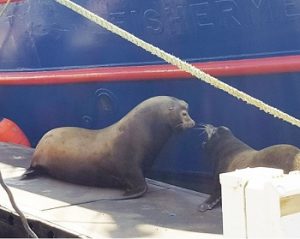
Yaquina Bay: California Sea Lion breeding season is heating up!
As their breeding season approaches, the mostly male sea lions of Yaquina Bay are growing hormonal and more aggressive as they prepare to head south for courtship. The pinnipeds that crowd the docks of Newport’s harbor are California sea lions. The typical adult male is close to 8 feet long and weighs between 700 pounds and a half ton, while adult females are usually 6 feet long and weigh less than half as much. The Steller sea lion is also found in the area but tends to stay away from harbors, favoring to haul out on sea rocks and buoys offshore.,,, The Marine Mammal Protection Act makes it illegal to hunt, capture, kill or harass sea lions, with limited exceptions for the deterrent hazing of individual nuisance animals. >click to read< 12:01
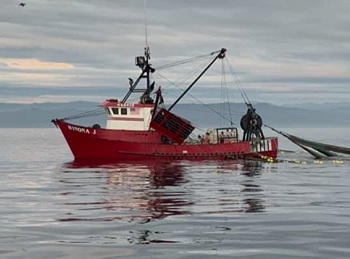
Coronavirus: Oregon fishing industry weathering the storm
For the people who fish, the distributors, and the restaurants, Gov. Brown’s stay-home order has been costly. “The hardest part about all of this is the uncertainty,” said commercial fisherman Mike Retherford. Normally, you’d find Retherford out on his boat the Winona J. But these days he’s spending a lot more time at his home in Newport sheltering in place. “If this goes on for too long you could see business down 40-50%,” he said. But what was looking really grim a couple weeks ago when crab prices dropped from about $7 a pound down to about $2 is now looking a bit better. The price of crab has rebounded as distributors find new ways to market. >click to read< 07:52
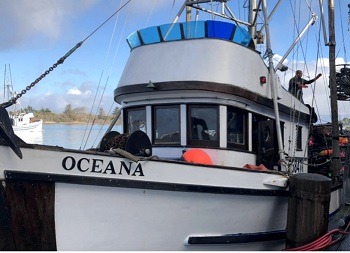
Coronavirus: Seafood Industry Comes to ‘Screeching Halt,’ But Some Businesses Adapting
Harrison Ibach, a commercial fisherman based out of Eureka in Humboldt County, says that when the coronavirus hit the U.S., his business dried up practically overnight. “Oh, man, the seafood industry has pretty much come to a screeching halt,” Ibach said. Since 2008, he’s fished for black cod, rockfish, salmon and crab out of the Woodley Island Marina. Most of his catch goes to high-end fish restaurants in San Francisco. But now, Ibach says, those restaurants aren’t buying. “We now know that the vast majority of Americans really enjoy seafood,” Ibach said, “But we’ve also learned that they really enjoy eating seafood at restaurants.”,, Ibach, who has a wife and two young children, says he has gotten creative in response. He recently started to sell fish directly off his boat, >click to read< 20:19

City of Morro Bay will allow fishermen to sell directly from boats starting May 1
“We have about 90 active boats fishing commercially,”,,”If the restaurants and the state doesn’t reopen, the fishermen are going to have to sell directly off their boat to the consumer,”. The City of Morro Bay has already approved for that to happen starting May 1, as long as social distancing is maintained. As of May 1, anyone will be able to buy whole salmon, rock fish and crab from the commercial fishing boats docked in Morro Bay Harbor. The fish will be sold whole, not filleted. Hafer says to look for signs in the harbor and along the Embarcadero directing you to the boats selling fish. Also, remember to bring an ice chest and plenty of ice. >click to read< 08:43
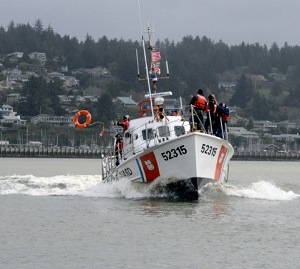
Coast Guard completes 13-hr overnight tow of fishing vessel offshore Port Orford, Ore.
A Coast Guard 52-foot Motor Lifeboat crew towed a disabled 68-ton commercial fishing vessel Tuesday morning across the Coos Bay Bar, west of North Bend. Watchstanders at Coast Guard Sector North Bend received a report at 3:38 p.m. Monday that the 61-foot fishing vessel Pacific Faith, with four people aboard and 10,000 pounds of fish, experienced a loss of power about 9-miles west of Port Orford and were drifting south. A Coast Guard Station Coos Bay 47-foot Motor Lifeboat crew launched at 4:47 p.m. and arrived on scene at 7:13 p.m. The MLB crew towed the Pacific Faith for 12 hours; mitigating fatigue during that time by rotating positions. >click to read< 06:28
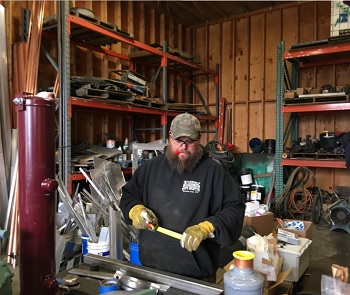
Coronavirus: Restaurant Closures Put Oregon Seafood Industry In Limbo
Commercial fisherman Clint Funderburg should be on the ocean right now, catching Dungeness crab on his fishing boat, the Widgeon. When crab prices tanked a few weeks ago, he shifted gears to his off-season side gig. So, he’s building a refrigeration system for one of the many fishing boats that are stuck at the dock right now. Mandatory restaurant closures during the coronavirus pandemic have sent shock waves through Oregon’s $700 million seafood industry. The overwhelming majority of the seafood that lands on Oregon’s docks gets eaten in restaurants, and no one knows when that market will return. In the meantime, fishermen are parking their boats as seafood prices plummet. >click to read< 18:04

Court Finds American Lobster Fishery Requires Incidental Take Statement for Impacts on North Atlantic Right Whale
As commercial fisheries across the United States continue to adjust operations in the face of new legal requirements, such as the shift from single-species to ecosystem-based management, one challenge in particular has dominated the courts: the Endangered Species Act (ESA). Recent court decisions have vacated commercial longline fishing permits in federal waters off the coast of California that could endanger the Pacific leatherback sea turtle and restored prohibitions on gillnet fishing gear in a known New England feeding ground for the endangered North Atlantic right whale. This trend continued on April 9, when a federal district court judge in Center for Biological Diversity,,,The American lobster fishery is managed cooperatively by the Atlantic States Marine Fisheries Commission and NMFS, >click to read< 14:45
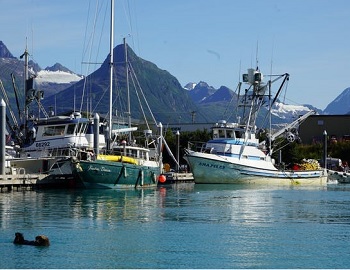
While coronavirus threatens seafood economy, community fisheries find ways to stay afloat
Major commercial fisheries, including the iconic Maine lobster fisheries, have ground to a halt.,, Consider the lucrative Pacific halibut fisheries, which opened in mid-March. These fisheries largely serve fine dining restaurants. Combined with the loss of sales to markets like China, seafood producers from east to west are without a market for their product. Combined with the loss of sales to markets like China, seafood producers from east to west are without a market for their product. But decades of globalization, industrialization and environmental change have brought many coastal communities to the brink, because of coastal development, climate change or they’ve lost fishing rights to industry consolidation. To meet this moment, many need more than just an invigorated customer base. >click to read< 12:16
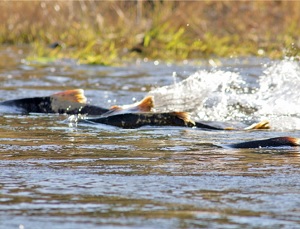
West Coast salmon season taking shape – Feds Look at Protections for Oregon Spring-Run Chinook Salmon
The Pacific Fishery Management Council has adopted ocean salmon season recommendations that provide recreational and commercial opportunities for most of the Pacific coast and achieve conservation goals for the numerous individual salmon stocks on the West Coast. >click to read< 17:25
Feds Look at Protections for Oregon Spring-Run Chinook Salmon -A petition seeking to extend federal wildlife protections to spring-run Chinook salmon found along Oregon’s coast has merit and could warrant listing the fish under the Endangered Species Act, Conservation groups Native Fish Society, the Center for Biological Diversity, and Umpqua Watersheds submitted a new petition in September 2019 specifically for spring-run salmon. >click you< 17:33
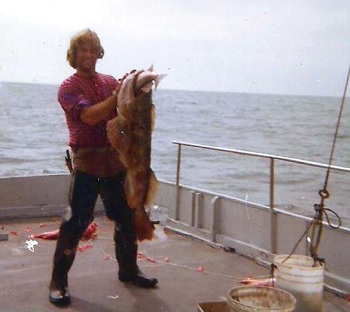
Harry Graham Goes Fishing
Harry Graham was a local surfer and fisherman. I only briefly got to know him near the end of his life. We did a page together about surfing and his friend Tom Linker, but he also gave me a bunch of photos of his commercial fishing days. Unfortunately, he passed away before I got much info on these. So I asked a few friends, a got a little info, and found some info in my notes. I think these are mostly from the early 80s. So here are some historic photos of some legendary characters doing their thing in an earlier time. By Tom Modugno >click to read< 16:02
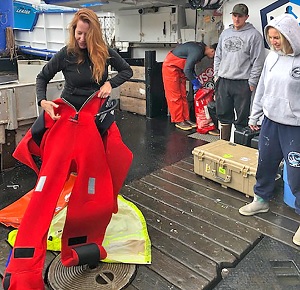
What it’s really like to join the ‘Deadliest Catch’ crew at sea for a day
“Bait!” Capt. Sig Hansen’s voice booms at me from the wheelhouse of his crab fishing boat, the Northwestern,,I’ve joined his five-person crew for a day as the ship’s newbie, or “greenhorn,” to help set gear. It feels just like I’m on the unscripted Discovery hit Deadliest Catch…except I’m not on camera. My assignment: hooking bait bags inside the 875-pound steel-framed crab pots that are dropped one at a time into the churning sea. I climb awkwardly into the 8-foot-tall, 7-foot-wide pot that sits perched on the boat railing, secured by a cable. As I try to attach the bag, my two layers of gloves cause me to fumble, although another reason might be hearing Sig shout, “Turn and burn!” and “Time is money! by Kate Hahn >click to read< 13:51
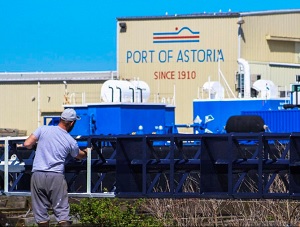
Coronavirus undercuts Port of Astoria’s progress
Will Isom, the Port’s executive director, has focused on low-cost projects that benefit the agency and keep staff busy during a massive drop-off in business caused by the coronavirus.,, Bornstein and Da Yang seafood companies, which employ hundreds of people processing, freezing and shipping catch on Pier 2, have so far kept operating while checking workers’ temperatures, increasing sanitation and enacting more social distancing. “It is a constant concern and effort,” said Andrew Bornstein, co-owner of Bornstein Seafoods with his family. “We have installed partitions, spaced out lines, broken up lunch and dinner breaks to have less people in the lunchroom at a time.” Commercial Dungeness crab prices were already hurt by China’s travel restrictions and ban of live-animal imports during the coronavirus outbreak. >click to read< 09:31
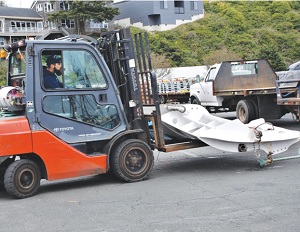
Port of Newport workers still providing services during coronavirus outbreak
With both agricultural and transportation implications, the Port of Newport is considered part of the country’s critical infrastructure as defined by the U.S. Department of Homeland Security. “Although the port is considered an essential public service provider, just like everyone, we had to adjust to the pandemic,” said Paula Miranda, port general manager. That decision-making led to keeping the commercial marina and international terminal operating while closing or significantly limiting some of the recreational facilities. The result is an “all hands on deck” call, to which the staff has responded favorably. “I can’t praise our staff enough,” the general manager said. >click to read< 09:59

With Coronavirus pandemic ravaging our country, temporary relaxation of fishery regulations is urged to help fishing industry
Thanks to our Senators and Congressmen who worked to get specific aid to the fishing industry, that has been hit particularly hard by the closure of restaurants, where 70 per cent of seafood in this country is consumed. Fishermen and wholesalers have had to adapt on the fly and find other ways to market their product to various degrees of success. The closure of so many vital aspects of our domestic economy will have effects that will still be felt a long time after the Virus is tamed.,, I am requesting that NMFS immediately contact the various management councils and commissions to request that special meetings [webinars] of fishery advisory panels be held to discuss the pro’s and cons of this idea, and what fisheries could benefit.,,, By Jim Lovgren. >click to read< 20:48
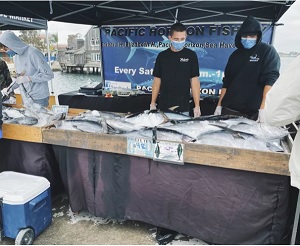
Coronavirus: San Diego’s Fishing Community Pivots to Stay Afloat
The COVID-19 shutdown of many of the city’s restaurants has left much of San Diego’s commercial fishing fleet reeling, and right now they’re doing everything they can to stay afloat including shifting the way they’re selling fish at the weekly Tuna Harbor Dockside Market, which has remained open as an essential business. “The commercial fishing fleet has always provided food for people and we’re still here,” says commercial fisherman Kelly Fukushima. “We want them to know they can rely on us to put food on people’s tables.” The crisis has been hard on local fishers. Commercial fishermen David Haworth and his son, Nick, had to scramble when wholesalers started calling them to say they could no longer sell their catch amid widespread restaurant closures. Home deliveries helped move the load of fish,,, >click to read< 15:31
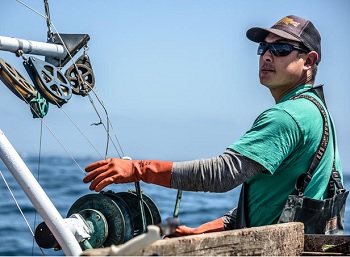
Local Commercial Salmon Fishing Industry Sees Silver Lining Amid Coronavirus Crisis
California’s fishing industry is designated as essential by Governor Gavin Newsom, but their usual markets, restaurants, are all but shut down because of the coronavirus. That’s spelling trouble for local fishermen and women. Still, some believe there’s a silver lining to this crisis. David Toriumi has been commercially fishing the Monterey Bay for almost 16 years. It’s a livelihood full of challenges, from rigorous and expensive regulations to changing ocean conditions. But the coronavirus is like nothing he’s seen before. Toriumi says the impact was slow at first, less people eating out, and then boom. >click to read< 08:44
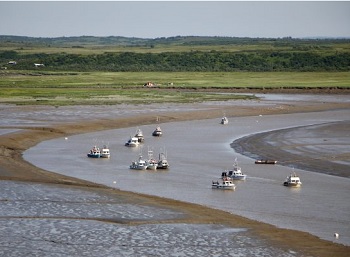
Coronavirus: Dillingham urges governor to close Bristol Bay fishery to protect the community
The City of Dillingham and the Curyung Tribal Council wrote a strongly worded letter to Governor Mike Dunleavy Monday urging him to consider closing Bristol Bay’s massive commercial fishery to protect the community from the coronavirus pandemic. Bristol Bay’s summer fishing season brings with it an influx of thousands of fishermen and processor workers into small communities around the region. The sockeye fishery is the largest in the world. Last year its preliminary ex-vessel value was the highest ever, at $306 million. In the letter, the tribe and the city said that there was no way to limit the communities’ exposure to the virus, even with the current requirement for processors to submit quarantine plans for their workers. >click to read< 17:05
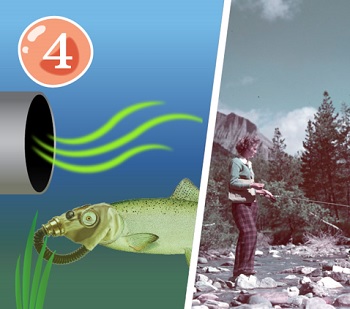
The Deadly Gauntlet Fraser Salmon Must Travel to Come Home
The rockslide at Big Bar just north of Lillooet was a natural disaster that blocked the Fraser last summer, making it impossible for many returning salmon to return to their natal spawning streams. Of the five million sockeye expected to return for example, only about 300,000 made it to their spawning grounds. The only upside of the disaster is that it’s shining a new light on what we call the Gauntlet: the tortuous path that all six species of Pacific salmon must run every year as they return from their migrations on the high seas to fresh water streams across the 21 million-hectare Fraser River watershed. The rockslide was an act of nature that with engineering expertise and brute force can eventually be fixed. But as the Gauntlet illustrates, what will prove much harder is to save Fraser salmon from the trajectory of decline they were already on before the rockslide happened. >click to read< 21:26
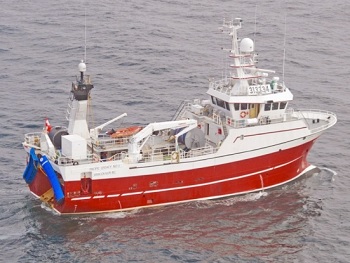
A research expedition returning to Victoria puzzled by a no-show of the fish after an initial big haul
“It is a little difficult for people to accept that scientifically, no catch is sometimes as important as large catches. I think this is the case here,” said Richard Beamish, who is organizing the $1.45-million expedition with fellow B.C. scientist Brian Riddell. “We had relatively large catches of pink, chum and coho early in the survey and there were no salmon in the same area a few weeks later.” It is clear that there are probably large schools of species such as coho that are moving over large areas in response to some factor, Beamish said. The chartered trawler Pacific Legacy No. 1 left Victoria on March 11, headed up to the southern part of the Gulf of Alaska and fished off Dixon Entrance. On Friday, it was 513 miles off Cape Beale, west of Ucluelet. The team expects to return to Victoria on Tuesday. >click to read< 10:32
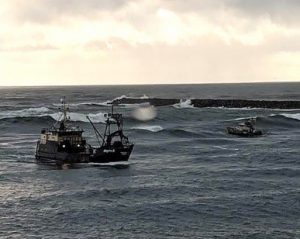
More than a pin
The call for assistance from the fishing vessel Brenna A had already come in, and the Coast Guard Station Umpqua River crews were preparing to swap duty sections. The oncoming duty section was led by the Coast Guard’s newest Surfmen, Petty Officers 2nd Class Enrique Lemos (#559) and Aaron Hadden (#560). The two of them discussed the escort request upon reporting for duty at 7 a.m. They knew from the morning bar report that the Umpqua River bar was breaking at 14-feet on the series and also had 10 to 12-foot steep swells. The vessel, a 107-foot 198 gross ton fishing vessel, en route to Alaska had never crossed the Umpqua River bar before. They also knew that they were supposed to stand in front of their shipmates at 8 a.m. and be pinned with the distinctive surfman pin, a silver-colored life ring on top of two crossed oars. Photos, >click to read< 13:25
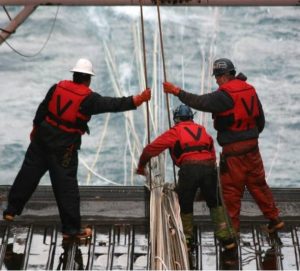
Profiles in Training: American Seafoods Company
Lance Camarena recognized from a young age that he wanted to work in the learning and development arena.,, Today, Camarena is Director of Training & Organizational Development for American Seafoods Company, a fishing company which runs six factory trawlers ranging from 256 to 341 feet. The company employs approximately 1,300 seafarers from 52 countries, with about a 7% turnover in our key officer positions and a 25% turnover in our entry level processor positions. American Seafoods has also implemented a Marine Learning Systems learning management system (LMS) e-learning solution and created the American Seafoods Knowledge Academy (ASKA), which can be accessed from almost any device to complete mandated training. >click to read< 11:04
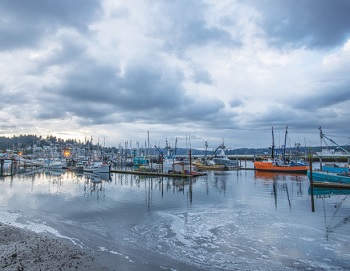
Coronavirus: Yaquina Bay fishing continues despite market disruptions
As part of the food-production chain, commercial fishing is considered an essential industry, but even though fishermen based out of Newport’s Yaquina Bay are still on the job, they have felt the impact of the current market disruptions stemming from the COVID-19 pandemic.,, “Some crabbers are still trying to stick it out, others have probably called it earlier than they normally would,” Buell added. “There still is some effort happening, for sure. It’s kind of hard to keep up with everything, but it sounds like the Chinese markets may be opening back up a little bit, so they’re able to start moving some live crab there, which is helping.” >click to read< 07:47
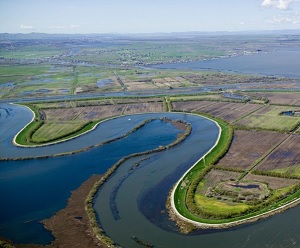
Californians urge Gov Newsom pause in Delta Tunnel planning during Coronavirus crisis
The state of California is continuing ahead with plans for the Delta Tunnel, a project to divert more water from Northern California for San Joaquin Valley agribusiness and Southern California water agencies, in spite of the COVID 19 global pandemic. Fishermen, Tribal leaders, conservationists, environmental justice advocates, scientists, many elected leaders, family farmers, Delta business owners and the general public oppose the construction of the environmental and economic damage it will cause to the Sacramento-San Joaquin River Delta, West Coast fisheries and the people of California. Dan Bacher reports, >click to read< 17:37
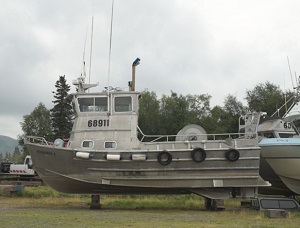
Coronavirus: Bristol Bay fishermen urged to delay travel to the region until at least May 1
On Thursday, the Bristol Bay Regional Seafood Development Association, which represents the Bristol Bay drift gillnet fleet, issued its first COVID-19 advisory to the fleet asking that non-local Bristol Bay Fishermen delay travel to the region until at least May 1 and listed the state mandated quarantine protocol for anyone who does travel to Alaska from out of state.,, Since Alaska enacted a limited entry permit system, the share of permits held locally by Bristol Bay residents has declined by more than 50 percent, according to a 2017 University of Alaska Fairbanks analysis. Many drift fishermen make the trip each summer from Washington, Oregon or California. >click to read< 07:49

Coronavirus: Letter from 200+ US seafood industry stakeholders to Trump Administration
March 24, 2020, Dear President Trump. We write as participants in America’s seafood supply chain, a critical component of the country’s domestic food infrastructure and one of the major economic drivers in our country’s coastal communities and states. Empty restaurants, cafes, and dining halls are a visible reminder of the ongoing, unprecedented public health efforts to blunt the spread of COVID-19. The livelihoods of the chefs, cooks, servers, and other staff are obvious and direct casualties of those government efforts. The economic disruption caused by forced restaurant closures and active encouragement for Americans to “shelter in place,” however, extend far beyond the food service sector. >click to read< 19:37








